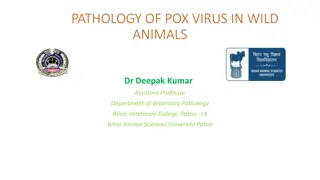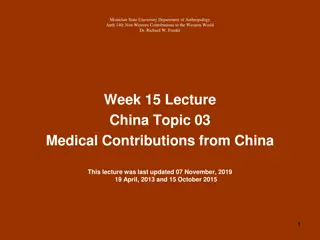Guru Har Krishan and Sikh Beliefs about Death
Guru Har Krishan, at a young age, cared for those dying in a smallpox outbreak in Delhi, showcasing Sikh beliefs in reincarnation and mukti. Sikhs believe in life, death, and freedom from the cycle of rebirth to unite with God. The purpose of life on earth is to make one's mind God's home and attain
0 views • 10 slides
The Origin of Viruses: Theories and Evidence
Viruses are acellular parasites with a complex replication mechanism. Studies on their origin present challenges due to the lack of fossils. Three main hypotheses include regressive, cellular origin, and co-evolution. The regressive hypothesis suggests viruses originated from complex ancestors that
2 views • 25 slides
The Columbian Exchange - Transfer of Goods, Ideas, and Diseases between Hemispheres
The Columbian Exchange was a significant transfer of animals, plants, culture, technology, and diseases between the American and Afro-Eurasian hemispheres in the 15th and 16th centuries. This exchange shaped the course of history, impacting populations on both continents through the introduction of
0 views • 10 slides
The Eradication of Smallpox: A Triumph in Global Health
Smallpox, caused by the variola virus, was a deadly infectious disease that plagued humanity for centuries. Through concerted global efforts, including mass vaccination campaigns and the use of innovative strategies like ring vaccination, smallpox was successfully eradicated in 1980. The last natura
4 views • 16 slides
Impact of English Colonization on Aboriginal Rights and Health in Australia
English colonization in Australia had a profound impact on current Aboriginal basic rights, health, literacy, and language. The arrival of Europeans led to the decimation of the Aboriginal population through diseases like smallpox, displacement from their lands, loss of cultural practices, and suppr
2 views • 9 slides
Pathology of Pox Virus in Wild Animals by Dr. Deepak Kumar
Pox viruses can affect wild animals, with Monkeypox emerging as a significant zoonotic virus in Central and West Africa. The disease shows similarities to smallpox but is less severe. Pox lesions are characteristic signs of infection, and outbreaks have been documented in regions with a history of s
0 views • 16 slides
Pioneers of Immunology: Jenner, Ehrlich, and Metchnikoff
Edward Jenner initiated the concept of vaccination by discovering that cowpox could confer immunity to smallpox. Paul Ehrlich differentiated blood cells, proposed the side chain hypothesis, and pioneered serum therapy and chemotherapy. Elie Metchnikoff developed the cellular theory of immunity, advo
0 views • 4 slides
Monkeypox Guidance for Midlands Region: Overview and Safety Measures
Monkeypox is a rare zoonotic virus with similarities to smallpox but lower mortality. The virus spreads through close contact and has an incubation period of 5-21 days. Symptoms include fever, rash, and malaise. Treatment is usually supportive, but severe cases exist. Isolation and protective equipm
0 views • 13 slides
Ancient Chinese Medical Contributions to the World
China has made significant contributions to global health and medicine, including the discovery of circadian rhythms, smallpox vaccination, and acupuncture. These advancements play a crucial role in both historical and contemporary healthcare practices worldwide. The learning objectives and key term
0 views • 64 slides
Edward Jenner: Pioneer of Smallpox Vaccine and Father of Immunology
Edward Jenner, a renowned figure in medical history, was born on May 17, 1749. He made significant contributions to immunology by developing the smallpox vaccine. His pioneering work involved inoculating individuals with cowpox to confer immunity against smallpox, a disease that was highly feared fo
0 views • 13 slides









